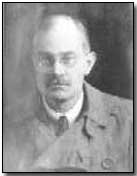Feature Articles - The Repression of War Experience by W. H. Rivers

Necessity of Adopting a Middle Course
In conclusion, I must again mention a point to which reference was made at the beginning of this paper. Because I advocate the facing of painful memories and deprecate the ostrich-like policy of attempting to banish them from the mind, it must not be thought that I recommend the concentration of the thoughts on just such memories.
On the contrary, in my opinion it is just as harmful to dwell persistently upon painful memories or anticipations and brood upon feelings of regret and shame as to banish them wholly from the mind.
It is necessary to be explicit on this matter when dealing with patients. In a recent case in which I neglected to do so, the absence of any improvement led me to inquire into the patient's method of following my advice.
I found that, thinking he could not have too much of a good thing, he had substituted for the system of repression he had followed before coming under my care one in which he spent the whole day talking, reading, and thinking of war.
He even spent the interval between dinner and going to bed in reading a book dealing with warfare. There are also some victims of neurosis, especially the very young, for whom the horrors of warfare seem to have a special fascination, so that when the opportunity presents itself that cannot refrain from talking by the hour about war experiences, although they know quite well that is bad for them to do so.
Here, as in so many other aspects of the treatment of neurosis, we have to steer a middle course. Just as we prescribe moderation in eating, drinking, and smoking, so is moderation necessary in talking, reading, and thinking about war experience.
Moreover, we must not be content merely to advise our patients to give up repression; we must help them by every means in our power to give up repression; we must help them by every means in our power to put this advice into practice.
We must show them how to overcome the difficulties which are put in their way by enfeebled volition and by the distortion of experience when it has long been seen exclusively from some one point of view. It is often only by a process of prolonged re-education that it becomes possible for the patient to give up the practice of repressing war experience.
I am indebted to Major W. H. Bryce, R.A.M.C., for permission to publish the cases recorded in this paper, and for his never-failing support and interest while working under his command in Craiglockhart War Hospital.
"Gas Bag" was a slang term for airships.
- Did you know?
